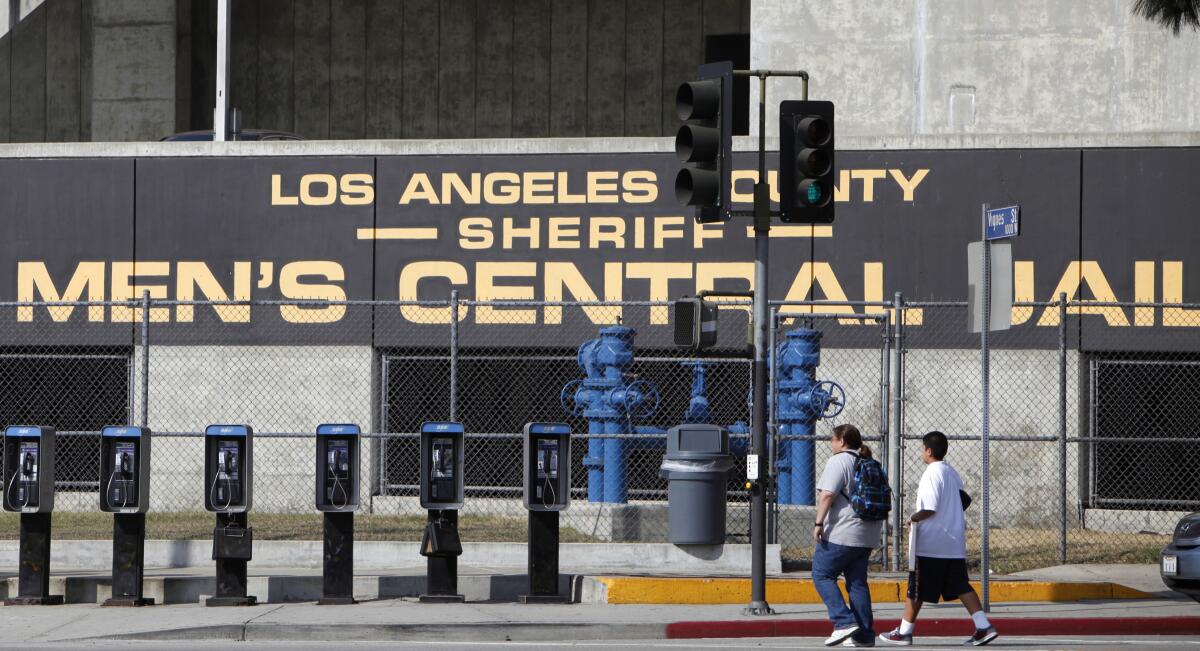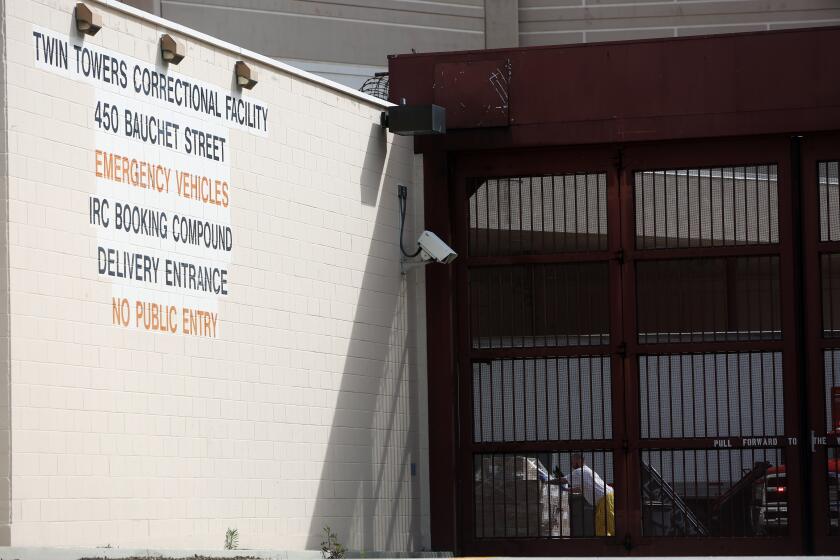L.A. County says phone calls will be free in all its jails by Dec. 1

- Share via
Two years after pledging to make phone calls free for the roughly 13,000 people incarcerated inside the county’s seven jails, the Los Angeles County Board of Supervisors has given the Sheriff’s Department a deadline to get it done: Dec. 1.
The five supervisors voted unanimously Tuesday on a motion that gives the department four months to stop charging inmates and their families for phone calls.
“The family members who have loved ones in our jails I don’t think can wait any longer,” said Supervisor Hilda Solis, who initially co-authored the motion with Supervisor Holly Mitchell.
It’s the third motion the board has passed in two years meant to inch the county closer to making phone calls free across all county jails. The other two motions both went through in 2021, when supervisors asked the Chief Executive Office to explore how much it would cost and what funding source should cover it.
Supervisors said Tuesday this motion would be the one to finally make free phone calls inside county jails a reality, following in the footsteps of other big California counties including San Francisco and San Diego.
“We’ve been talking about it. We’ve been motioning it,” said Board Chair Janice Hahn. “Today is the day to do it.”
The vote comes amid growing pressure from advocates and attorneys, who have accused the county of extorting the inmates it’s locked up with steep prices they have no choice but to pay.
“When you talk about making our communities better, you don’t do it by charging families who are already on the fringes so much for commissary and calls,” Kent G. Mendoza-Morales, manager of advocacy and community organizing at the Anti-Recidivism Coalition, told The Times earlier this year. “As one of the richest counties in the world, how is it that we’re expecting people to pay so much for something that is cheaper on the street?”
As in other California counties, the millions of dollars Los Angeles pulls in each year from jail phone calls goes back to the Sheriff’s Department. Under state law, it has to be deposited in the department’s Inmate Welfare Fund, which is supposed to be used mainly for the benefit and education of inmates.
In April, lawyers targeting the price of phone calls and commissary items in jails across the state sued several counties — including Los Angeles — over what they alleged amounted to an unlawful tax levied on the county’s poorest residents. The lawsuit also alleged the money has been spent on “general jails issues,” including salaries and office furniture, rather than services that benefit inmates.
The lawsuits accuse California jails of marking up commissary and calls so much they’ve created an “unlawful tax.”
“The millions of dollars in commissions that the companies agree to pay the County annually in exchange for these exclusive contracts are completely passed through to inmates, their families, friends, and attorneys, in the form of extortionate and outrageous prices, which are then used by the County to fund its jails,” the lawsuit said. “These ‘commissions,’ though denominated as such, are actually unlawful taxes.”
Nationally, the average jail charges about $3 for a 15-minute phone call, according to the Prison Policy Initiative. In California that figure is slightly lower, around $2 per call — still an impossible cost for some inmates and their families, who are disproportionately poor and disproportionately people of color.
The supervisors all signaled this week that they felt it was the county’s duty to shoulder the burden of these calls. According to Fesia Davenport, the county’s chief executive Officer, that burden could be in the ballpark of $30 million annually, which includes $15 million to cover the cost of the calls and another $15 million to fund programs currently being funded by the call revenue.
And as of Tuesday, the supervisors were still unsure about where that money would come from. The motion asked Davenport to “identify the necessary funding.”
Though she initially co-sponsored the item, Mitchell voiced the loudest concerns, criticizing it as “sound on policy but weak on fiscal analysis.” She said she saw the motion as yet another example of the county greenlighting ambitious new policies without making it clear how they’ll be funded.
Mitchell ultimately pulled her name as co-sponsor but voted for the motion after the supervisors tweaked it to ask Davenport’s office to consider using money from the Inmate Welfare Fund.
Bianca Tylek, executive director of the criminal justice advocacy group Worth Rises, said in an interview she was “excited” about the board’s stance on the matter. But she questioned the accuracy of the anticipated cost, pointing out that when SB 1008 — the state legislation that made prison phone calls free — passed last year, it was only estimated to cost $12 million for a much larger population. More recently, when Minnesota voted to make phone calls free for its roughly 8,000 state prisoners, she said, the state estimated that it would cost $3.1 million.
“We think it’s way past due for Los Angeles to do this given that San Francisco and San Diego already have,” Tylek said. “But while we’re optimistic, we’re only cautiously optimistic because they did do this in 2021, two years ago. We’re just wanting to make sure it actually happens this time.”
More to Read
Sign up for Essential California
The most important California stories and recommendations in your inbox every morning.
You may occasionally receive promotional content from the Los Angeles Times.
















